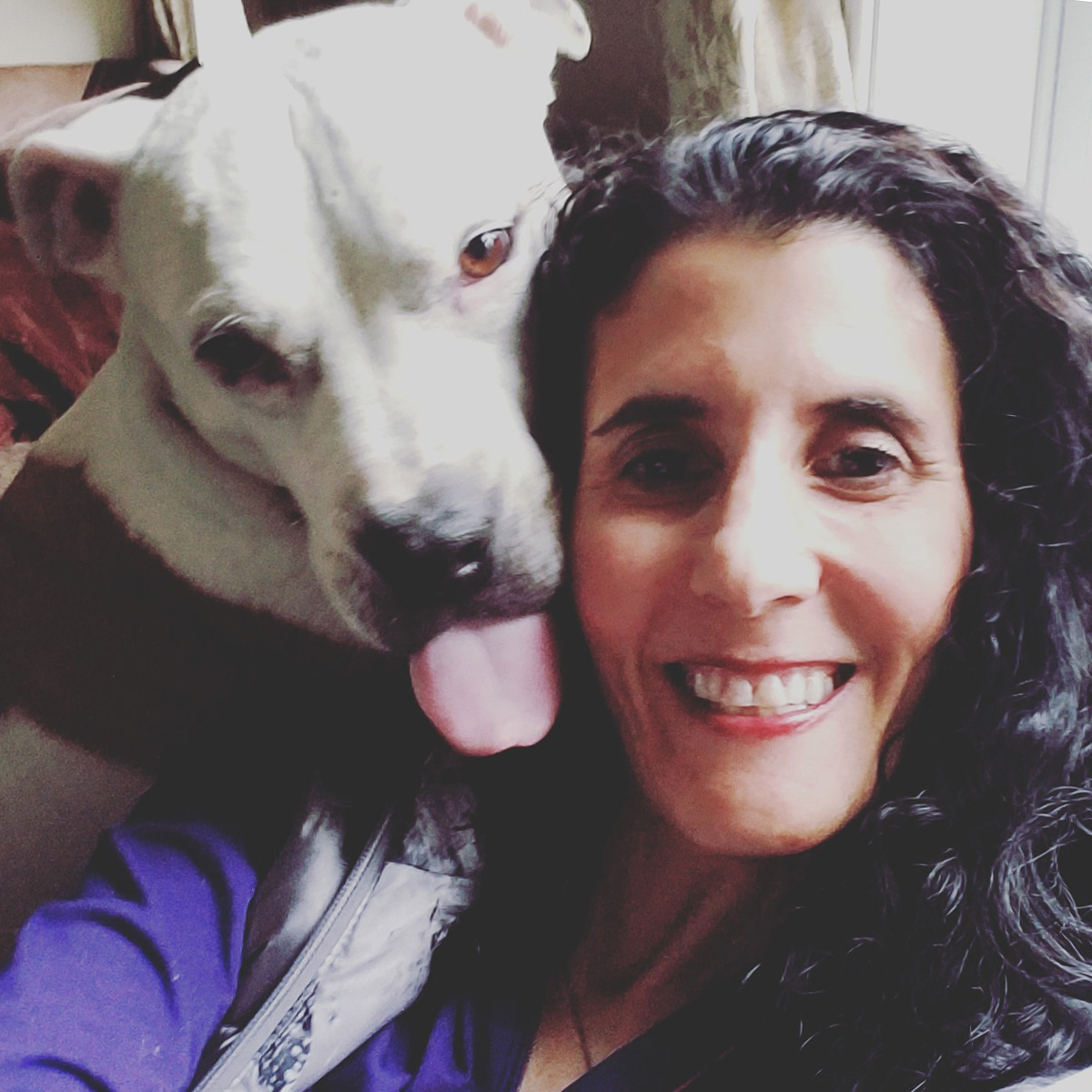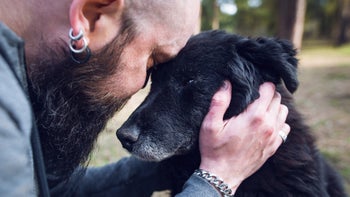
Why Is Your Dog Coughing, and When Should You Go to the Vet?
Key takeaways:
Several conditions, such as dog flu and kennel cough, can cause coughing in dogs.
If your dog’s cough is persistent or sounds worrisome, take them to the veterinarian to rule out serious or highly infectious health conditions. Be prepared to tell the veterinarian how often your dog coughs and what the cough sounds like.
Your veterinarian will diagnose your dog’s cough by evaluating their medical history and current symptoms, running blood tests, and taking X-rays.

Dogs make many sounds, and owners get used to the occasional snort, sneeze, howl, or grunt. Still, as pet parents, we tend to worry whenever our pet might be feeling under the weather. So it’s only natural to take note when your dog coughs.
Like humans, all dogs cough from time to time. Coughing is the body’s natural way of protecting the respiratory system. But sometimes coughing is a sign of a more serious health condition.
Why is your dog coughing and hacking so much?
All dogs cough periodically. They may cough simply to clear their throats. Dogs navigate the world with their noses and mouths. So it’s easy for dirt, grass, or unwanted materials to enter their nose or throat and cause irritation — and then coughing.
Save on the top 10 pet medications
Save big on common pet medications like Fluoxetine and Levetiracetam at your local pharmacy.

GoodRx is NOT insurance. GoodRx Health information and resources are reviewed by our editorial staff with medical and healthcare policy and pricing experience. See our editorial policy for more detail. We also provide access to services offered by GoodRx and our partners when we think these services might be useful to our visitors. We may receive compensation when a user decides to leverage these services, but making them available does not influence the medical content our editorial staff provides.
Several conditions, ranging from minor to life-threatening, can cause coughing in dogs. Here are a few common conditions that cause dogs to cough.
1. Canine influenza
Commonly known as dog flu, this condition is similar to the human flu in that it is a highly contagious respiratory virus. But dog flu is caused by a different virus than the flu humans get. So dog flu is not spread to humans from dogs or vice versa. Dog flu does cause coughing, though, and can be a serious condition for your pup.
2. Foreign objects in the throat
If your furry friend gets an object stuck in their throat, they will naturally cough to remove it. If you notice your dog coughing, a good place to start is by checking their throat to see if anything is stuck there.
3. Environmental allergens
Allergens are substances such as dust, pollen, cigarette smoke, or anything else in the environment that your dog’s immune system overreacts to. For example, if your dog is sensitive to dust, their immune system may react as if it were being attacked by a foreign virus or bacteria. This can lead to coughing, as it does in humans.
4. Pneumonia
Pneumonia is a respiratory infection that causes inflammation in the airways of a dog’s lungs. Pneumonia in dogs is usually caused by a bacterial infection or as a complication of a viral infection such as dog flu. It can also be caused by your dog accidentally inhaling vomit or regurgitation into their lungs.
5. Bronchitis
Bronchitis, another respiratory infection, occurs when bronchial tubes become inflamed. It can be short-term or chronic (lasting for over 2 months). Bronchitis is often caused by irritants in the air, such as cigarette smoke or air pollution.
Stuffy noses: Dogs can get congested, just like people. Here’s how to help your dog if they’re stopped up and having trouble breathing.
Common colds: Your dog can catch a cold, but it’s not the same as a human cold. Read all about the signs of and treatments for colds in dogs.
Asthma med: Fluticasone (Flovent) is an inhaled steroid that can treat inflamed airways in dogs. Learn more about fluticasone’s uses in dogs.
6. Heart disease
This is one of the most common reasons for a dog to have a cough that does not clear up within a few days. Heart disease prevents the heart from pumping blood effectively throughout your dog’s body. Dogs who have heart disease will usually display other common heart disease symptoms, in addition to a cough.
7. Tracheal collapse
Tracheal collapse (tracheal chondromalacia) is a chronic, progressive condition that causes a dog’s trachea (windpipe) to become soft and flatten out, restricting their airway. This condition is most commonly seen in small and toy dog breeds, such as chihuahuas, Pomeranians, poodles, Yorkshire terriers, and pugs.
8. Kennel cough
Kennel cough often causes a persistent, nagging cough in an otherwise healthy dog. A dry, hacking, or “honking” cough is usually the telltale sign. Your dog may also have coughing spasms or coughing fits.
Read more like this
Explore these related articles, suggested for readers like you.
Other kennel cough symptoms may include:
Sneezing
Lethargy
9. Heartworms
Heartworms are parasites that infect dogs. They’re transmitted from animal to animal by mosquitoes. When first infected, some dogs may not show signs of illness. But over time, a dog infected with fleas may have respiratory symptoms, such as coughing and difficulty breathing.
What are the various types of dog coughs?
Different types of canine coughs, and the sounds they make, are associated with different health issues. That’s why you want to pay close attention and take note of the following types of coughs you might hear.
Hacking cough
A dry, hacking cough can sound like a dog is trying to dislodge something from their throat or mouth. A raspy-sounding, hacking cough can be a symptom of kennel cough, a contagious upper respiratory illness that dogs often get from places where many dogs congregate.
Honking cough
A deep, dry, honking cough that sounds like a goose honk can be a symptom of kennel cough, a catch-all term for a disease that can be caused by a number of bacteria or viruses. A goose-honk sound can also be a hallmark of tracheal collapse.
Wet cough
A wet, phlegmy cough that sounds moist could indicate dog flu or pneumonia. It could also indicate congestive heart failure. If it sounds like your dog is gargling or coughing up phlegm, this suggests an issue in their lower airway (or lungs). If you hear this cough, seek medical attention right away.
Gagging cough
A high-pitched cough that sounds like your dog is gagging can be a symptom of a sore throat or another upper airway irritation or blockage.
Coughing at night
A cough that occurs only at night or when your dog is sleeping can suggest a potentially serious underlying health condition. Be sure to mention to your veterinarian if your dog’s cough occurs only at night or worsens when they are sleeping.
When should you bring your dog to a vet for a cough?
While a cough every now and then is normal, a persistent cough is not. Some of the health issues that cause dogs to cough are very serious. Others, while easily treatable, can become serious if left untreated.
Only your veterinarian can diagnose your dog’s condition and start them on the right treatment plan. If your dog is coughing, you should make an appointment with the vet. When you call their office, be sure to mention if:
The cough has become worse.
Your dog has lost their appetite.
Your dog is lethargic.
They have a fever.
Your dog has other health problems.
How is coughing in dogs diagnosed?
Veterinarians consider several factors when diagnosing a cough in dogs. They often start by looking at a dog’s medical history. This can help them determine the cough’s origin. Your location, travel history, and environment can also play a role in your dog’s cough diagnosis. These can point to your dog’s exposure to airborne irritants.
In addition, a veterinarian may order a series of tests. Vets use test results to narrow down what’s causing or contributing to the cough.
Tests to diagnose a cough in dogs include:
Blood work
Heartworm test
X-rays
Upper airway exam (under sedation)
Bronchoscopy (an exam of the inside of the lungs)
CT scan
Your veterinarian may also ask the following questions:
What does the cough sound like?
When does the cough occur? (At night? After exercising? When your dog is lying down?)
Is your dog up to date on all their shots and heartworm preventive?
Where has your dog been lately? (A boarding facility or doggy daycare? On a family vacation?)
How can you treat your dog’s cough?
Once your veterinarian determines the cause of your dog’s cough, they will discuss the best treatment plan.
Your veterinarian may prescribe cough suppressants to make your dog more comfortable. They may also recommend antibiotics and other medications or treatments.
Antibiotics
Antibiotics your dog’s veterinarian may prescribe for coughing include:
Azithromycin
Marbofloxacin
Trimethoprin-sulfamethoxazole
Other medications
Depending on the cause of your dog’s cough, they may need to take other medications. These can include:
Butorphanol (cough suppressant)
Fluticasone (inhaled steroid)
Hydrocodone / homatropine (cough suppressant)
N-acetylcysteine (medication that breaks down mucous)
Prednisone (steroid)
Theophylline (bronchodilator or airway relaxer)
Additional treatment options include surgery to remove obstructions, acid suppressants for acid reflux, and chemotherapy for lung cancers.
If a fungal infection is to blame for their cough, your dog may need an antifungal medication for at least 6 months.
What are some home remedies for your dog’s cough?
Home remedies can help your dog feel better as they recover from their cough. Always make sure your dog has plenty of fresh water. In addition, consider providing your pup the following:
Warm recovery area: They should have a quiet, warm, draft-free area in which to rest and recover.
Humidifier: You can also put a humidifier in the area where your dog rests. The steam will moisten the air your dog breathes. This may relieve some of the irritation in their respiratory tract.
Steam: If you are taking a hot shower, use the opportunity to give your pooch some steam therapy. You can let them stay in the closed bathroom — but not in the shower — with you.
Also try loosening your dog’s collar or using a harness for walks while they are coughing. Otherwise, pulling on a collar may irritate the neck and windpipe.
Frequently asked questions
No, never give your dog human cough syrups or over-the-counter (OTC) cough medications. These medications contain ingredients that may harm dogs. Only give your dog medications as directed by your veterinarian.
Yes, kennel cough often goes away on its own without treatment. But your veterinarian may recommend medications to ease your pup’s symptoms. They may also prescribe an antibiotic to curb bacteria that causes a more serious type of kennel cough.
Tracheal collapse is most common in older toy and small dog breeds, such as Yorkshire terriers, Pomeranians, and toy poodles. There is no cure, but treatments can manage symptoms and improve quality of life.
The bottom line
You may be wondering why your dog is coughing. Dogs cough for many reasons, ranging from simple throat-clearing to a life-threatening illness. There are many types of dog coughs, such as hacking, honking, and wet coughs. There are even more possible causes, including dog flu, tracheal collapse, and kennel cough.
To diagnose a dog’s cough, your veterinarian may look into their medical history, run blood tests, and take multiple X-rays. Treatment often includes cough suppressants, antibiotics, and other medications, depending on the cause. The best thing you can do is call your veterinarian as soon as you notice that your dog has a persistent cough.
Why trust our experts?



References
American Animal Hospital Association. (2024). What dog owners need to know about canine respiratory infections.
American College of Veterinary Surgeons. (n.d.). Tracheal collapse.
American Veterinary Medical Association. (n.d.). Canine influenza: Veterinary resources.
American Veterinary Medical Association. (n.d.). Heartworm disease.
Brooks, W. (2024). Chronic bronchitis in dogs. Veterinary Partner.
Brooks, W. (2024). Kennel cough in dogs. Veterinary Partner.
Centers for Disease Control and Prevention. (2024). About dog flu.
Dowling, P. M. (2024). Drugs used to treat lung and airway disorders. Merck Veterinary Manual.
Ford, R. B. (2014). Kennel cough revisited. Today’s Veterinary Practice.
Hsieh, B. M., et al. (2020). Coughing in small animal patients. Frontiers in Veterinary Science.
Hulsebosch, S., et al. (2019). Evaluating and managing chronic cough in dogs. Today’s Veterinary Practice.
Johnson, L. (2013). Why is this dog coughing? World Small Animal Veterinary Association World Congress Proceedings, 2013.
Kuehn, N. F. (2024). Pneumonia in dogs. Merck Veterinary Manual.
Kumrow, K. J., et al. (2012). Canine chronic bronchitis: A review and update. Today’s Veterinary Practice.
Richard P. Riney Canine Health Center. (n.d.). Tracheal collapse. Cornell University College of Veterinary Medicine.
Rishniw, M. (2024). Congestive heart failure in dogs and cats. Veterinary Partner.
Rishniw, M. (2024). Mitral valve disease in dogs. Veterinary Partner.
Sherding, R. (2001). Diagnosis and management of bacterial pneumonia. World Small Animal Veterinary Association World Congress Proceedings, 2001.




























